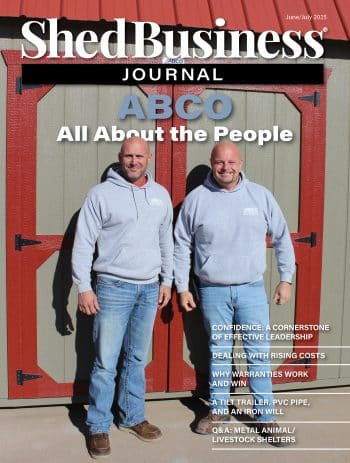
The coronavirus/COVID-19 pandemic continues to restrict movement and contact, impacting businesses throughout the country.
That includes suppliers who provide the materials and services shed builders need.
Still, say some suppliers, the industry is doing its best to adapt and serve its customers’ needs, despite the pandemic.
For example, at Cardinal Manufacturing, which sells Mules that assist in moving sheds, “new equipment orders have dropped significantly,” says Steve Borntrager of the company’s sales and customer service department.
The service and parts departments have also slowed but are not at zero, he notes.
The Illinois-based company, which typically employs between 15 to 20 people during its peak season, has cut employee hours while trying to retain everyone on staff. While production has diminished, crews are working “staggered shifts to lessen the likelihood of spreading COVID,” says Borntrager.
Because it services truckers who move sheds and supply equipment, Cardinal Manufacturing’s work is considered “essential” to the economy by the state of Illinois. Therefore, while its output has noticeably lessened, the company’s doors have remained open to its staff.
According to Adrien de Maleissye, sales manager for Innovations Manufacturing, “the whole industry got hit pretty hard.”
The Colorado company manufactures and sells ramps, sill plates and skylights for sheds, among other products.
The incredible changes in business and personal life wrought by COVID-19 came at a time when the economic outlook for the shed industry looked positive.
“We started off great this year. We were looking forward to a prosperous spring and summer season. Unfortunately, COVID-19 had other plans for the economy,” says de Maleissye.
However, rather than focusing on the negative, he is choosing to think positively.
“I believe the shed industry will recover quickly and may grow faster than ever before,” says de Maleissye.
He says that once Colorado allows them to reopen their retail outlet in Denver, it will be with specific, yet currently undetermined, customer incentives such as temporary price breaks or promotions.
The goal of those programs would be to “help us all get back to work.”
At Rochester, New York’s A+L Paint, a paint manufacturer catering to the shed industry, the doors to the retail store were closed due to COVID-19 on March 22.
Initially, the company laid off one employee, but they were quickly recalled when it was decided A+L Paint would adapt its machinery to manufacture hand sanitizer. Whereas A+L Paint was not considered essential when the state initially shut most businesses, that soon shifted dramatically when the company started making the hand sanitizer.
Other changes in the way A+L conducts business during the pandemic include leaving customer orders on its shop’s front porch. They will also deliver purchases over $200 in the immediate area, free of charge, says Jonathan Zook, the company’s general manager.
He says store sales are down 10 to 15 percent from this time last year.
The idea to manufacture hand sanitizer came about when management “saw the need. We had resources and the ingredients to make the product for sale,” so they did.
Says Zook, “If you’re not flexible, survival is less likely. People who can adapt will succeed.”




